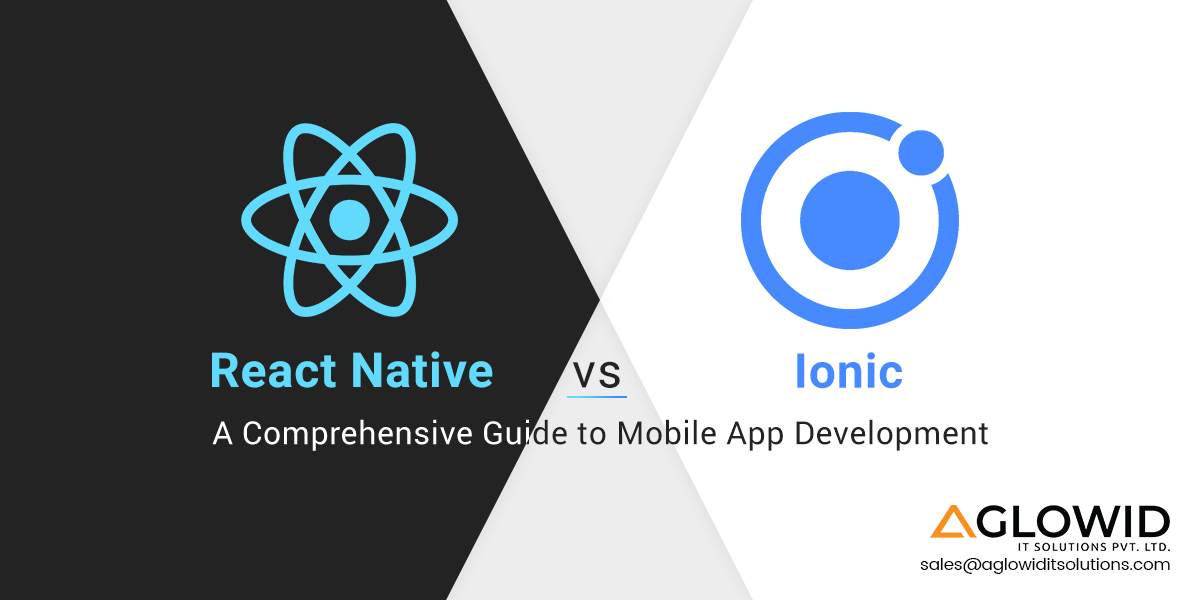App building platform is not just limited to Swift or Objective-C for developing iOS app and Java (Android Studio) for Android apps anymore.
In fact, there are many different platforms have evolved over the years to create outstanding applications for cross platforms such as for Android, iOS, Windows, etc.
React Native and Ionic are the talk of the town, recently. The two frameworks are famous for building cross-platform and native apps and becoming increasingly popular among developers.
However, the involvement of multiple platforms has created chaos whether which one, out many out there, to choose.
Perplexity to selecting a right app development platform for Android and iOS is solved here.
We have explained every single detail, including the pros and cons of the two top hybrid app development frameworks -React Native and Ionic.
In Search of Hiring ionic Developers?
Build feature-rich, scalable & user-centric mobile apps in record-breaking time with our dedicated ionic app developers
Difference Between Native App and Hybrid App
So, before we equate the two Mobile App Development platforms, we need to know the basic differences between the Native and Hybrid app.
Native App
Basically, Native apps are those which are developed for specific Operating System (OS) such as iOS and Android. The apps are developed using a supported language of OS, for example, Native Apps for iOS written in Swift or Objective-C language while Java or Android Studio language used for Android App.
Hybrid App
A hybrid app is not native. Yes, it is a combination of native and web app to work on cross-platform which allows users of both Android and iOS to install it into their devices and use it as a native app. It uses web technologies such as HTML, CSS, and JavaScript to write and render the application. Native features in the hybrid application accessed by Cordova or PhoneGap plugins.
According to MarketsandMakets.com “The cross-platform market is estimated to grow from $25.19 Billion in 2015 to $80.45 Billion in 2020 at a CAGR of 26.1% from 2015 to 2020.”
That’s the basic ideas of the Native app and Hybrid app. Now, let’s understand what Ionic and React Native are and how they are different from each other.
Catch up with the competitive analysis of the two platforms right here.
Lets Start with React Native First and check why React Native App Development is Popular!!!
What is React Native?
Built and released by Facebook in 2015 on a public platform, React Native is a JavaScript framework for developing universal mobile apps which are compatible for cross-platform such as iOS and Android. It uses a mobile platform instead of the web platform and the look and feel of the React is truly native. It has reasons why it is closer to native.
Can Native App build on React Native Platform?
If you want a straightforward answer, then it’s “No”. But, it gives you the true experience of Native apps. That means you have two benefits together when you build Mobile apps based React Native.
The primary codes can be shared across platforms such as iOS and Android.
Developers can write a mobile application on React Native that feel truly ‘native’.
In short, React Native uses JavaScript along with XML-esque markup, known as JSX as primary languages and uses native components to render. That means the output is truly native. That’s the way Facebook claims that it provides the true native app on React Native platform. However, it is 100% closer to native, but again it’s not ‘native’.
Benefits of React Native
Today, we have multiple open-source platforms which are easy to use and comfortable to create applications. React Native framework is the need of time as it provides a number of benefits to mobile app developers while creating applications. Let’s take a look at its top benefits and why it is so popular.
Simple Functionality:
The use of just plain JavaScript, best component-based approach and declarative view make code precisely predictable which help in easy debugging and make the entire things easy and comprehensive.
Easy to Learn:
React Native is easy to learn and work. That means anyone having basic knowledge of programming can understand React Native easily.
Native Approach:
React Native library to provide a reliable platform to build Mobile applications for iOS and Android devices which uses native components to render.
Why React Native Best For Your Business
React Native turned out to be the most popular JavaScript library in a very short span of time since its inception due to it fast, scalable and simple natures.
Here’re quick facts to choose React Native Development
- It makes writing JavaScript easier
- Compatible with cross-platform
- Smooth functions and trouble-free nature are top reasons to opt for
- Develop a high-performance website
- It is easy to understand and can help developers to work effectively
- React Native is known for the best result for your web application
Why React Native Stands Alone
There are many tools, libraries, and frameworks which are very useful development platforms, but a few of them have changed the way of functioning and revolutionized the workflow. React Native is one such open source JavaScript library which has transformed the tech industry and provided robust JaveScript framework/library to developers across the globe.
Top Features of React Native
There are a plethora of things why React Native important for developers and industries. For example;
Learn Once, Use Anywhere
The mantra or you can say the motive behind React is ‘Learn once, write anywhere’. That means the once you find the solution how to build an iOS app on React Native, you automatically learn how to create the same for Android.
Re-Usable Code
The components created using React Native are re-usable. That means there is no need to rewrite new codes.
JSX
The regular JavaScript for templating has been replaced by JSX due to its simple HTML quoting which is used as HTML tag syntax, helping faster sub components rendering. JSX + JavaScript turn into React frameworks.
Single Way Data Flow
It provides faster data flow while emitting the traditional way of binding and reducing the boilerplate.
Virtual Document Object Model
Gone were the days when developers had to render complete data if it requires any changes after completing the work while in React Native, developers need to render only the changed component.
Zero Dependencies
Unlike most other technology platforms, React Native is an independent library/framework that provides complete freedom to developers try a small feature in your ongoing project.
Does React Native has any Drawbacks
As with anything, of course, React Native also has few drawbacks. However, whether or not React Native is fit for your project or developer team entirely depends on individual preferences. As far as risk or drawback is concerned, it is new and going through any improvement. Therefore, it may create some problem as there are some features which are not supported on iOS and Android.
Okay, That’s all for React Native…
Now Lets take a deep into Ionic App Development.
What is Ionic?
Founded and released in 2012, Ionic is an open-source mobile app framework which offers developer-friendly tools to create high-performance hybrid applications for cross-platform such Android, iOS, Windows, etc. Just like Native, it uses web technologies such as JavaScript, CSS, and HTML5 to write. But to render, it uses web component. Ionic also uses PhoneGap or Cordova to access native features in the applications. On the other hand, it makes the development process significantly fast and smooth.
What Does Ionic Offer?
It’s a complete development kit with a rich library of front-end building blocks and UI. Ionic mainly focuses on the look, feel and User Interface of an app. The developer-friendly tools offer to create outstanding applications for both mobile web apps and native apps.
How does Ionic useful Developer Team?
It is fast and easily developed and help them deliver the project within the deadline. At the same time, Ionic 3.0 has released with major updates which include an integrated suite of tools, live app updates, real-time error monitoring, etc.
Benefits of Ionic Framework
It has many benefits to help developers create unique cross-platform applications. Most importantly, it supports lazy loading which makes the application very user-friendly. Besides, there are many other benefits of Ionic which we have explained in the following points.
Write Once, Run Anywhere
That means you do not have to write a different set of programming code for each platform (Android, iOS, Windows, etc.). If you have written code for iOS, it will be sued for Android also.
Easy to Learn
Ionic is, undoubtedly easy to learn and any developer with basic knowledge of programming language can learn it quickly.
Ionic Community Support
Ionic has a large community worldwide (across 200 countries) with more than 5M developers. The community is all meant to create a better atmosphere for developers around the world to use their skills in developing apps.
That’s all for basics of Both Ionic as well as React Native
Lets check it in brief which exactly drive you to choose the best fit for your end goal.
React Native Vs Ionic – In Brief
Both Ionic and React Native are best based on individual choices, though they both differ in functionality. So, here’s a little effort of ours to differentiate the two frameworks on certain grounds, hoping that you will find it useful.
| Ionic | React Native |
| Ionic is open-source hybrid development framework. | React Native is JavaScript framework by Facebook to carte interactive UI. |
| Ionic web technologies such as JavaScript, CSS, and HTML5 to write. | JavaScript along with XML-esque markup, known as JSX as primary languages. |
| It uses web technology to render. | React Native uses ‘native’ component to render. |
| It is based on TypeScript | It is based on JavaScript |
| It works on the mantra, “Write once, run anywhere”. | It works on the mantra, ” Learn once, use anywhere”. |
| It has a large community support. | React Native also has large community support. |
Winding Up
Comparing the above, we can say that first you had to first rectify your goals and priority. Based on that you can choose the right one between React Native Vs Ionic for your mobile app…
Of-course its little bit technical but, you will be 100% sure that you will get the best ROI in result and get the best app you ordered by hiring dedicated developer.
Still Confused???
No Worries… We are here to help you. Just Ping us and share your dream. Our Experience will definitely be useful to choose the wise…
And Guess What? Our Consultation is absolutely Free… Feel Free to contact us and solve your dilemma.
Are you in Dilemma of Choosing
Mobile App Development Framework?





 Say
Say